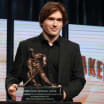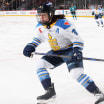Colton's baseball career leads to playoff success with Lightning
Former coaches say playing sport helped forward become 'cool customer' in clutch

© Mark LoMoglio/Getty Images
But those who have seen the Tampa Bay Lightning forward have NHL success say his ability to knock a horsehide baseball with a bat past opposing fielders is a big reason why. And they say the mental toughness needed to be successful in baseball has helped make the 25-year-old a clutch hockey player, as he has been again for the Lightning this season in the Stanley Cup Playoffs.
"He can really compartmentalize it," said Danny Murphy, one of his former hockey coaches. "I wonder to what degree that he gets that from baseball. As a great hitter, you're going to strike out. So you have to compartmentalize things. I wonder how much that transfers."
Murphy coached Colton at The Taft School in Watertown, Connecticut, in the 2013-14 season, when Colton led the team with 25 goals in 24 games as a high school junior.
But it was while watching him as a third baseman on the Taft baseball team that Murphy developed his theory on why Colton has been able to shine in the big moments.
"He has high hockey IQ but he doesn't overthink it," Murphy said. "That's the same thing with baseball. At some point you've got to get in the (batter's) box and just see it and rip it. You can't think too much. I think there's a lot of kids that don't have that anymore because they're specializing, they don't have [those] other sports to help them develop that mental side of the game.
"Hockey's a hard game, [but] baseball's a harder game mentally. He was really good at baseball so it's a natural … those mental and physical skills have carried over to serve him really well in his hockey career."
Colton said he can see how baseball helped him as a hockey player in the mechanics of the game.
"For me, just the natural instincts of seeing the ball and the hand-eye [coordination] and kind of recognizing pitches and stuff like that," he said. "It's such a fast-moving game that I think for me at a young age it kind of translated on the ice a little bit with just how fast the plays developed."
That mechanical and mental edge he gained has allowed him to shine in the biggest moments. He scored in the Lightning's 1-0 victory against the Montreal Canadiens in Game 5 of the Stanley Cup Final last season that gave them the Cup, and with 3.8 seconds left in the third period for a 2-1 victory in Game 2 of the Eastern Conference Second Round against the Florida Panthers on May 19.
That goal helped the Lightning sweep the Panthers in the best-of-7 series and move the two-time defending Cup champions into the Eastern Conference Final, where they will play the New York Rangers or the Carolina Hurricanes.
"I think it's innate," said Rick Freeman, who coached Colton in 2013 with the Hamilton (New Jersey) American Legion Post 31 baseball team. "Some guys have it, some guys are blessed with it. Maybe it can be developed to an extent, but in his case it seems like he carries that with him."
Colton has carried it with him as far back as he can remember to his days growing up in Robbinsville, New Jersey.
"Little League All-Stars, my 10-year-old year, we won states," he said. "We went like 16-0 or something like that and I had a couple big home runs throughout that little run, which back then I guess was pretty cool."
That was just the beginning of Colton elevating his play.
Freeman said Colton was dependable in the field and at the plate. One moment that stuck with Freeman was when he called for a hit-and-run late in a tied game because he was confident Colton could deliver. His hit drove in the winning run from first base.
"You can't do anything about the results," Freeman said. "It's the approach and the response, and his approach was great and his response was great. The results are really out of your hands once the ball leaves the pitchers hand or the ball leaves the bat. There's not a lot you can do about it. He was pretty good at understanding that. Pretty impressive at a young age. But obviously he has that in him and it's served him well.
"He was a cool customer, nothing seemed too big for him. That's the way he's moved on throughout his career."
After attending Princeton Day School for his first two years of high school, he went to Taft as a junior and showed his big-game ability on the ice against the rival Hotchkiss School.
"We were down 1-0, came out for the second period and he rifled in two big-time goals," Murphy said. "He would do those things and he would do them in big games."
Mark Carlson, coach of Cedar Rapids of the United States Hockey League, witnessed Colton's growth during the forward's two seasons with the team.
After a solid first season (33 points; 18 goals, 15 assists in 58 games), Colton was named captain in 2015-16. He set a Cedar Rapids record by scoring 35 goals in 55 games, including the winning goal against Waterloo to clinch the Anderson Cup, awarded to the team with the best record in the USHL. The game was tied 2-2 with 3:33 remaining the third period when Colton came up big.
"It was a tight game … and he willed himself by a defenseman to the point where he could get a shot off and scored the game-winning goal in that game," Carlson said.
It led to Colton being selected by the Lightning in the fourth round (No. 118) of the 2016 NHL Draft.
He played the next two seasons at the University of Vermont, scoring 50 points (28 goals, 22 assists) in 69 games and demanding to be on the ice in the biggest moments.
"He's an ultimate competitor that way," said Kevin Patrick, a Vermont assistant coach during Colton's time there. "He's a guy that both wants to be and expects to be on the ice in those situations. He wants that pressure. … Whether it's taking the offensive face-offs down a goal needing to tie it, or defensively taking that face-off when you're up a goal and the other team has got their goalie pulled, he wanted his number called in those situations."
Patrick agreed that this mentality relates directly to Colton's baseball success.
"I love youth baseball and I love kids playing it because there's nowhere to hide when you succeed or fail in baseball," he said. "You strike out or you're the pitcher that gives up that run, make an error in the field, there's nowhere to hide. With soccer, lacrosse, hockey, at those youth ages … you can hide from the pressure. Other than maybe a goalie who gives up a bad goal, the spotlight isn't on you in youth sports like it is in youth baseball. Learning to deal with that adversity, that success or failure, that baseball requires at a young age, I absolutely can believe if someone knew him playing baseball when he was younger, I understand why they'd say that.
"The best players out there have that short memory. … One mistake isn't going to turn into two or three because they start doubting themselves. Ross has that confidence that 'I'm going to be successful. I might make a mistake, but so what? I will get the next one.'"
Colton's baseball career ended when he opted to play hockey for Cedar Rapids. After Vermont, he played two full seasons for Tampa Bay's American Hockey League affiliate, Syracuse. He scored a goal in his NHL debut on Feb. 24, 2021, against the Hurricanes. In his first NHL season, Colton finished with 12 points (nine goals, three assists) in 30 regular-season games, then had six points (four goals, two assists) in 23 Stanley Cup Playoff games.
This season he had 39 points (22 goals, 17 assists) in 79 regular-season games and has eight points (five goals, three assists) in 11 playoff games. The five goals are tied with Corey Perry for the Tampa Bay lead.
But what if he had stuck with baseball? Freeman believes he would have been successful and played in college, like his father, Rob, did at Rider University.
"If he put all his eggs in the baseball basket, he would have played (NCAA) Division I," Freeman said. "I think he ended up putting his eggs in right basket. And he looks like he's on his way to a good career."
NHL.com staff writer Tom Gulitti contributed to this report

















